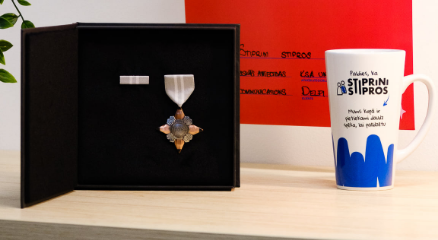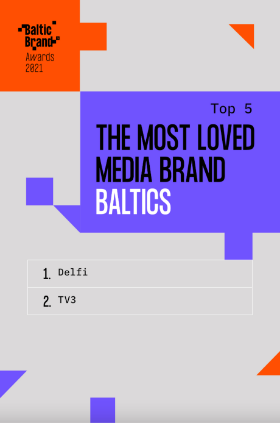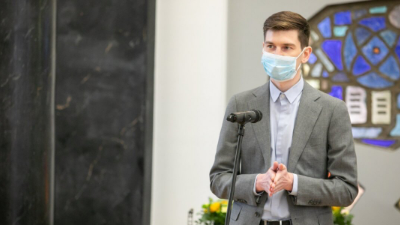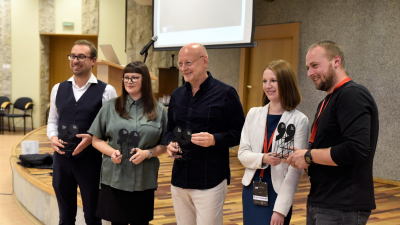Media Responsibilities

Impact, role and responsibility of media companies in the society
Ekspress Grupp is the leading media group in the Baltic States and therefore, it plays a significant role in promoting the society. The Group’s periodicals are the main companies that shape the public information space in its three home markets. Besides, being a company of a considerable size, the Group has the responsibility to manage all group companies in an ethical and accountable manner, and create independent, professional and reliable journalistic content. Group companies need to be managed in an honest, law-abiding and ethical manner – it is the basis of trust by the parties related to the Group and the general public.
An agreement has been reached within the Group concerning the areas and activities embodying social impact and responsibility.
We wish to be:
Independent and modern content creator
- Always accessible through convenient and attractive digital information solutions
- Content to be created is reliable, journalists are independent and ethical
- Always accessible through convenient and attractive digital information solutions
- Content to be created is reliable, journalists are independent and ethical
Attractive employer
- Retention and training of professional staff
- Equal treatment and valuing of diversity
- Retention and training of professional staff
- Equal treatment and valuing of diversity
Responsibly-managed company
- Open and honest management
- Setting and fulfilment of the goals related to sustainable development
- Open and honest management
- Setting and fulfilment of the goals related to sustainable development
Promoter in society
- Supporting open and participatory democracy
- Addressing topics of major social impact
- Supporting open and participatory democracy
- Addressing topics of major social impact
We raise important topics in the society, draw attention to them, and talk honestly and openly about them.
Journalism plays a clear role and we need to fulfil it. We definitely want to offer balanced journalism and it means that we need to select which topics and how to cover them. High-quality content and provision of balance is becoming more important and yet a more complex challenge. 
Our approach to
responsible journalism
Journalistic ethics starts with independence
Journalism needs to be independent and free. The work of journalists and periodicals should not be influenced by business interests, political links, personal relations or gains, bribes or any other benefits. The principles of balanced journalism are followed in all group companies. Various parties are allowed to express themselves and counter-arguments and if necessary, excuses, are permitted. The sources of presented information are always verified. Each journalist is responsible for source and confidentiality protection. In case of sensitive topics, the line of ethics should be perceived.
Standing up for credibility and freedom of speech
An ongoing and increasingly sharper polarisation of the society will increase pressure on media houses to create and present reliable and high-quality journalistic content on time. Implementation of these takes will help ensure news readers both today and tomorrow.
Review of message boards by human moderation
In case of online publications, comment sections play a key role since they enable readers to express their views on issues that they consider relevant. The media outlets of Ekspress Grupp promote the use of comment sections, i.e. message boards by registered and logged in users. For removal of improper comments, human and machine moderation is used.
It seems to us that trust in media has no fallen, but it is the entire chain of attention that has changed and information has become fragmented. The worldview is impacted by who reads what and in which channels. For example, today young people are not the users of traditional media. 
Hate speech influences the work of journalists
At the times of crisis, the society’s various sore points raise to the surface. For this reason, the media’s task to offer balanced and fair information is even more important. When tensions grow, confrontation between opposing parties may become hostile as we witnessed in 2021 that brought an increase in the number of both verbal and physical attacks against the editorial offices of media houses and journalists. In social media, there were calls for physical attacks on Delfi journalists.
Clear boundary between journalism and content marketing
Content marketing continues to grow as a format and sets requirements and restrictions for all media houses, including the Group's media outlets, to ensure credibility and transparency. The Group is firmly convinced that journalistic content of periodicals must not be influenced by the interests of advertisers, content marketing or the organisation of the Group's own commercial events. The line between advertising and media editing should be clear, content marketing and other content shown for a fee should be clearly identifiable and highlighted accordingly.
Media creates value by raising important topics
Media’s responsibility is to cover relevant and problematic topics. It is also an opportunity to highlight and draw attention to the society’s sore points and key processes that need to be changed, and impact them in a positive direction.
According to the latest surveys, the coronavirus pandemic dealt a heavy blow to the global journalism. The latest annual report of the Reporters without Borders (RSF) reveals that that the situation has sharply deteriorated and journalism is being blocked, either in full or partially, in two-thirds of the 180 observed countries. According to the global press freedom indices, the media in the Baltic States is free – in the chart for 2021, Estonia ranked 15th (2020: 14th), Latvia 22nd (2020: 22nd) and Lithuania 28th (2020: 28th). The ranking of Latvia and Lithuania did not change while Estonia slipped by one spot.
Fact-checking assumed a new meaning in the year of the crisis. At the start of the corona pandemic, there were a lot of so-called half-facts and lies, pseudoscientists and doctors popped up. The fact-checking section of Delfi grew strongly. We understood that one needs to be careful when publishing certain facts or leave them out altogether. If there is just a quarter of a lie in a sentence, we cannot publish it. 

Major topics in 2021
How we transformed the society through raising important topics
Revelations published in Õhtuleht cost the Minister of Education her job
Õhtuleht published several articles about the former Minister of Education and Center Party member Mailis Reps who was forced to resign after their disclosure of her misuse of power. Reps also had to step down as the party’s deputy chairman and head of the party’s MP group, and was not allowed by her party to run in the local elections in 2021.
Negligent use of public funds
Eesti Ekspress revealed the unexpectedly careless attitude of the then Prime Minister Jüri Ratas towards the state wallet at the highest level.
Experiment proved that package waste collected by consumers is incinerated instead of recycled
Maaleht and Eesti Ekspress proved in an experiment that although the state claims that package waste sorted by people end up being recycled, most of them are actually incinerated. There are different solutions available on state and company levels, but they are not implemented because of financial reasons. All this is further eroding consumers’ motivation to sort waste.
National forest statistics are widely inaccurate
Õhtuleht investigated in its articles the situation in Estonian forests and the role of the State Forest Management Center. Analysis of data proved that state statistics on forestry is wrong.
Payment of sickness benefits to cancer patients continues
Õhtuleht disclosed a case where the National Library had laid off an elderly woman who had a cancer diagnosis and had been on sickness leave for almost a year. The layoff ended the payment of her sickness benefit, because civil servants interpreted the law differently. After Õhtuleht intervened, Health and Labor Minister Tanel Kiik ordered to continue payments of the sickness benefit to the woman in spite of her layoff.
Disease does not care about age
In November, Delfi Latvia published an article about how a 33-year-old man who refused to vaccinate died because of coronavirus. The article created a heated debate in the society and encouraged people to vaccinate.
We raised the debate on domestic violence in Latvia
Delfi Latvia published an article about a violent art critic who had harmed several girls. The article triggered a heated public debate about family violence.
Lithuanian railway company schemed to keep trade flowing
Delfi Lithuania reported that the Lithuanian state rail freight company AB Lietuvos Geležinkeliai had made a prepayment to one of the world’s biggest fertilizer manufacturers, Belarussian company Belaruskaliji, for haulage of fertilizers although this would have violated the new US sanctions. The Lithuanian government announced that it was ready to resign because of the scandal, but remained in office.
We understand our role in the fight against the dissemination of fake news and propaganda, and this is becoming more and more important. The outcome of all this hard work was the title of the best European lie detector assigned to Delfi Lithuania. 

Our rewards in 2021
Estonia
Latvia
Lithuania
Ekspress Grupp Annual Report
EN
EE

About Ekspress Grupp

Group's key businesses and brands
Our strategy and business goals
Ekspress Grupp as an investment

2021 Summary

Group’s key figures 2021
Statement of the chairman of the management board
Major business results
Main events of 2021

Digital Media Company

Becoming increasingly digital
Digital media facts

Media Responsibilities

Public impact, role and reponsibility of media company
Major topics in 2021
Rewards and recognition

Responsible Business Practice

Customer experience and satisfaction
Development of the society and the sector
Our employees
Environmental management

Management Commentary

Ekspress Grupp Annual Report















